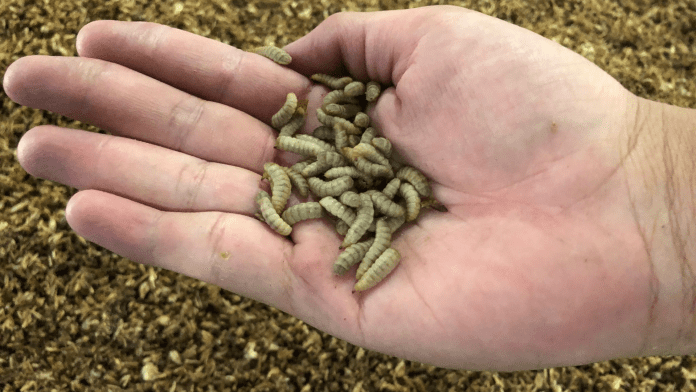Sumitomo Corp., one of Japan’s largest trading houses, is set to become the country’s first major company to sell insect-based feed for farmed fish. Starting later this year, the innovative feed will be available to customers, signaling a new era in sustainable aquaculture practices.
Insects have gained worldwide attention as a promising protein source in the context of decarbonization initiatives. The company’s objective is to import and market 30,000 tonnes of insect feed by 2030.
Having a stake in Singapore-based startup Nutrition Technologies, Sumitomo has acquired the exclusive distribution rights in Japan. The startup specializes in grinding black soldier fly larvae into powder, which is then used to create fish feed and pet food. With an annual production of around 3,000 tonnes of insect feed, Nutrition Technologies holds the second-largest volume worldwide.
Sumitomo is aiming to capture 7.5% of the 400,000 tonnes of fish meals that are consumed annually in Japan. The expected price of the insect feed will be approximately JPY 200,000 (USD 1,490) per tonne, which is similar to the price of fish meal.
The competitiveness of Nutrition Technologies is expected to hinge on the sustainability of their product. To this end, the company utilizes wood waste obtained from makers of processed food as a food source for the flies, highlighting their eco-friendliness.
In addition to being eco-friendly, this approach also aids in reducing carbon dioxide emissions for the food makers, as the wood waste that would otherwise be incinerated is repurposed.
Furthermore, Nutrition Technologies has the added advantage of not requiring any heating equipment for the cultivation of flies, as their facilities are situated in Southeast Asia, which benefits from a warm tropical climate. In contrast, two competitors in the industry, Protix in Holland and Innovafeed in France, have larger production capacities but are dependent on electricity for heating, as their facilities are located in Europe.
The insect feed market in Japan is relatively small, and data on it is limited. However, according to TPC Marketing Research, the country’s edible insect market is reportedly larger than that of insect feed, with a market size of approximately JPY 1.4 billion in 2022. TPC Marketing Research is based in Osaka.
The market for insect feed is projected to expand rapidly worldwide. Meticulous Research, a US-based firm, predicts that the global market for insect-derived alternative protein for both human consumption and animal feed will increase from JPY 17.5 billion in 2020 to approximately JPY 1.3 trillion by 2030.
Sumitomo aims to acquire marketing expertise in Japan, which it can leverage when expanding into international markets.
Insect protein is garnering interest as an eco-friendly feed option due to the significant reduction in CO2 emissions during production. As per certain evaluations, the production of one kilogram of insect-based protein can be nearly CO2-free.
Several other Japanese trading companies and startups are also investing heavily in insect feed, as it appears to be more palatable to consumers than edible insects.
In March, Marubeni and French insect farming startup, Ynsect, reached a preliminary agreement to collaborate on entering the Japanese market. The companies will work together on the research and development of insect feed for farmed fish, such as red sea bream and yellowtail, and intend to establish production facilities in Japan using Ynsect’s technology.
Read More: Insect farming startup Ynsect raises $175 Million to expand high-value food production
Booon, a startup launched by Nagasaki University, has initiated research on an innovative approach for cultivating mealworms. This technique employs container-type equipment to minimize both environmental burdens and expenses.
Although the United Nations predicts that the global population may rise by 23% from 2021 to reach 9.7 billion in 2050, it remains uncertain whether sufficient protein sources can be obtained to satisfy the needs of this expanding population.
As the world moves towards decarbonization on a global scale, protein sources that generate significant amounts of CO2 during production are encountering challenges. Insect feed could offer a solution to mitigate this issue.



